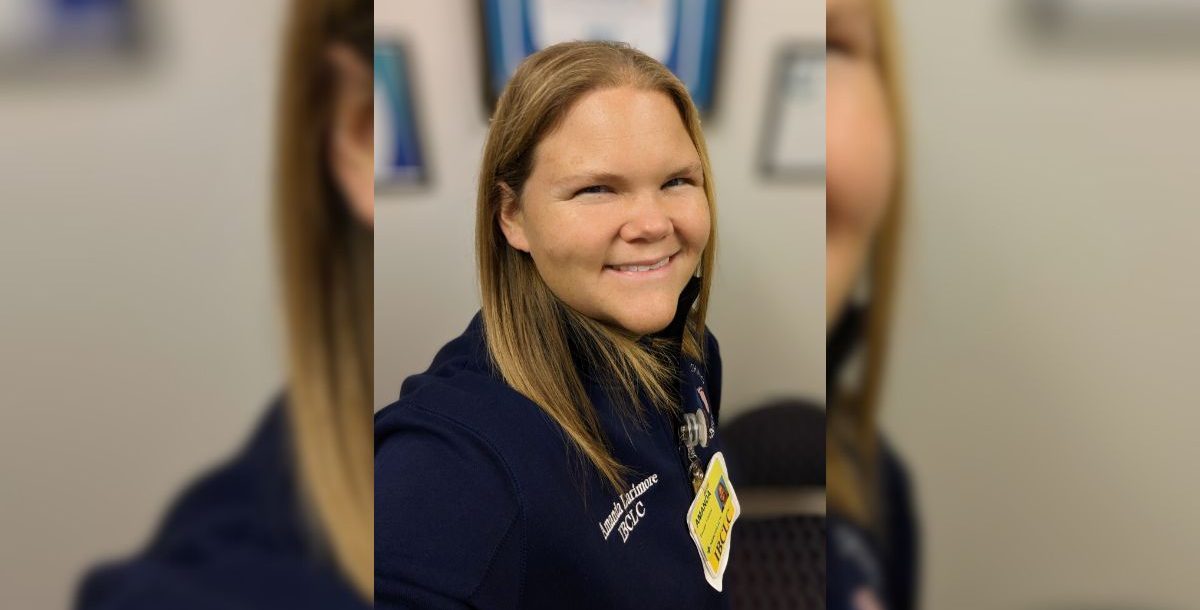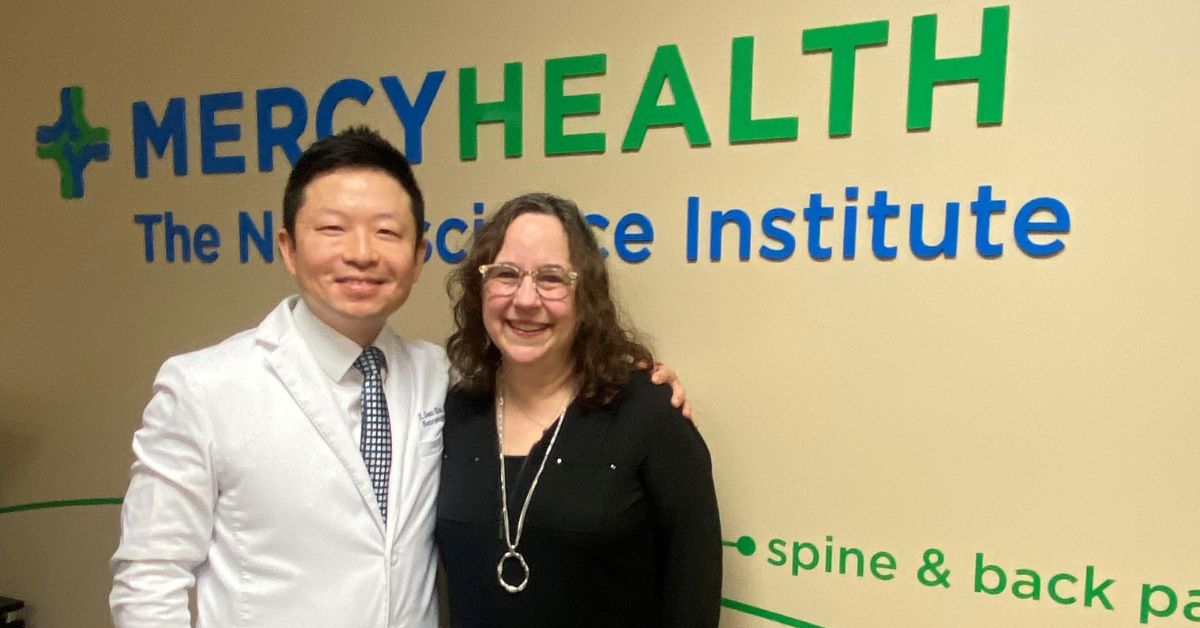Amanda Larimore, LBCLC, has made it her life’s mission to help mothers and babies thrive through the power of breastfeeding. As a lactation consultant, she has a deep understanding of not only the joys but the challenges that come with this natural process.
Amanda’s unwavering commitment to her role is fueled by her passion for empowering mothers, promoting the health benefits of breastfeeding and fostering strong bonds between mothers and their little ones. We recently sat down with Amanda to discuss her work and why she continues to make a difference in the lives of countless families.
Q: Can you tell us about your background and what inspired you to specialize in lactation consulting?
A: I became interested in helping families learn about infant feeding after going through feeding struggles with my own children.
My husband and I had our first child when we were 19. I knew I wanted to breastfeed. However, our daughter was born late preterm at 36 weeks, and breastfeeding did not go well. After several weeks of reaching out for help and feeling like no one was taking me seriously because of my age, I finally gave up on breastfeeding and switched to formula feeding.
A few years later, we welcomed our second daughter. This is when I found La Leche League, a peer-to-peer volunteer support group for infant feeding. I sought help from them, knowing I didn’t want my breastfeeding journey to end as quickly as it did with my first. It wasn’t easy, but I could meet my feeding goals with my second daughter with the right education and support. I went on to nurse my two sons as well.
I became a La Leche League leader in 2011. And then, after completing all the key requirements for applying for the exam, sitting for the exam and passing, I earned my International Board-Certified Lactation Consultants (IBCLC) certification. I’ve been working as a lactation consultant at Mercy Health – West Hospital since 2017.
The key difference between the children I could breastfeed and the ones I could not was education and support. This is why I chose to help other families meet their feeding goals, whatever that might be. I take pride in educating families on all types of infant feeding methods and helping them create a feeding plan that best meets their needs, whether breastfeeding, pumping, combo feeding or formula feeding.
Q: What are some of the most common breastfeeding issues that mothers face, and how do you help them overcome them?
A: In the hospital setting, we educate all parents on what is normal regarding breastfeeding, optimal positioning, latch-on techniques to aid in maternal comfort and anticipatory advice for what to expect and how to troubleshoot potential issues after discharge.
A common issue in the early days is the baby being too sleepy to want to nurse. Most parents are happy to find out that it can be pretty normal for babies to need a little extra rest in the first 24 hours. Being born is hard work, and rest is needed! We educate parents about this and encourage them to hand-express drops of colostrum to their babies until they become more interested in nursing. Most babies will pick up on feeding within the first 24 hours if given time.
Many mothers also come to me with concerns about low milk supply. Educating parents on what is normal regarding milk supply, normal pumping amounts and normal growth patterns for babies typically put these concerns at ease. Some people have a low milk supply, though helping them devise a plan to continue breastfeeding and get their infant fed appropriately is sometimes necessary. Overall, educating parents non-biasedly, helping them decide what feeding plan works best for their family and supporting whatever they choose is how I work as a lactation consultant.
Q: What are some common misconceptions about breastfeeding that you often encounter, and how do you address them?
A: One of those most common misconceptions about breastfeeding is that it has to be all or nothing. Exclusive breastmilk feeding is many parents’ goals, and my job is to provide education and support to help those people meet that goal. But not everyone has the same desires or goals of exclusive breast milk feeding, which is OK!
Some people might think that if they have to return to work after maternity leave, they shouldn’t initiate breastfeeding because they will have to switch over to formula when they return to work anyways. However, many lactating parents can maintain a milk supply via pumping while away from their baby. Additionally, both federal and state laws give these parents time and appropriate space to express their milk. Also, most insurance companies will cover a double electric breast pump at 100 percent coverage.
Q: How do you approach supporting mothers experiencing difficulties or frustrations with breastfeeding?
A: Adjusting to being a new mom is difficult. Feeding that little bundle of joy can be even more difficult! I always say, “breastfeeding is natural like walking, not natural like breathing.” It is a natural process, and most babies can learn how to be a good breastfeeder in the early days and weeks, but it takes time for both the mother and baby to learn how to breastfeed efficiently.
Education and support are key to helping these families. Being willing to take the time to listen to the family and their concerns as well as frustrations, educate them on what is normal and not normal, and work collaboratively with other specialties to find the right balance of breastfeeding support is what I strive for.
Q: Can you share some tips or advice for expectant mothers considering breastfeeding?
A: Know where to find breastfeeding support and education! Cincinnati and surrounding areas are lucky to have multiple options for finding the right type of lactation support for families. Hospital-based IBCLCs, private practice IBCLCs, lactation support in pediatric offices, WIC peer breastfeeding counselors, and LLL/Breastfeeding USA groups are some of the many places to reach out to prenatally to find out what services are available to help you with breastfeeding both before and after your baby is born.
Do your research, but also expect a learning curve when your new baby arrives. It’s great to be educated and aware of how breastfeeding works before your baby is born, but remember that babies (and moms) need a little time to learn how to breastfeed efficiently. Try not to get discouraged if you feel things are going well right away – know there are many people out there who are willing to help you meet your goals!
Q: Lastly, what message would you like to convey to mothers struggling with breastfeeding?
A: I desire every family to have access to quality education and support on infant feeding. All parents need to know that in a society that expects new families to handle everything independently, it is perfectly fine to seek help and support when necessary. There are individuals who are willing and able to assist you in achieving your feeding goals, no matter what they may be. Regardless of how you choose to feed your baby, always remember that you are the most significant person in their life, and they appreciate your effort every day.
Learn more about breastfeeding and lactation issues as well as the maternity care services we provide at Mercy Health.






